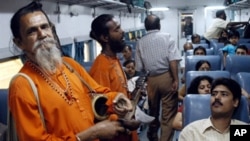It's a centuries-old culture - Indian minstrels who blend spirituality, marijuana and a search for the human body's most intimate secrets. And, it is being re-discovered by a new generation of international audiences.
"Go with devotion to the house of pleasure," run the lyrics of this song. "There is no sorrow, only happiness."
The singer, Paban Das, and his wife, Mimlu Sen, often serenade their neighborhood not far from Kolkata with songs like this from their centuries-old musical tradition, known as "Baul."
He says he fell in love with Baul songs because of their beautiful lyrics. He says it was later that the spiritual depth of Baul songs impressed him.
Although most of India struggles to escape poverty, Bauls embrace it proudly. They converge on the Indian town, Kenduli, every year, for a massive festival of music, communal begging and sharing of food and copious inhalation of marijuana smoke - a key component of Baul spirituality.
This man says Bauls like him have no money to flaunt - but that they don't need any money. He says he leads a life full of peace and happiness, with no material worries. He says a Baul is possibly one of the happiest men on this earth."
The word Baul means "madman" in Bengali. The music of the Baul tradition is haunted by themes of a constant search for balance between both the pleasures and the dangers of indulging the body.
This singer says ordinary people think a Baul is nothing more than a beggar who just wants to earn money by entertaining people and that is completely wrong. He says people choose this Baul way of life in search of God and happiness.
Historian William Dalrymple raised the profile of the Bauls in his global best-seller, Nine Lives. He says they are a unique product of the spiritual crossroads their region has been, throughout history.
"Baul philosophy derives from a mix of faiths that passed through specifically Bengal. There are strong elements of Buddhism, Tantra, but particularly of Sufi Islam and Vaishna Hinduism. They are almost the definition of heterodoxy. They are almost as unorthodox and as diverse in their beliefs as it's really possible to be," he said.
Dalrymple says the Bauls' unorthodoxy has historically pushed their role beyond that of just minstrels. It crosses over to that of a truth-telling court jester, or - as he labels it - "holy fool." "Men who defy convention, who speak truth to power, who swear at kings and get away
with it and who have a crazy wisdom which survives outside the mainstream," he said.
Mimlu Sen says Bauls see it as their duty to defy convention. Their frankness about the body and human sexuality challenges traditional Indian modesty. Bauls also confront the idea of religious orthodoxy, itself.
"The Bauls are a counter religion... they deliberately cross over religions to show that religion is superficial, and man-made. They transmit this message which is that no god exists in any temple, nor in any mosque nor any church. It's the body which is the temple. And, the Baul wanders, looking for his own reality," he said.
Paban Das and Mimlu Sen plan to travel abroad to promote an autobiography and companion music CD they put out last year called "The Honey Gatherers" - a reference to the Bauls' nomadic wandering in search of donations.
They say Baul music, and its message of intense self-knowledge as a path to enlightenment, are attracting a new generation of international followers.












